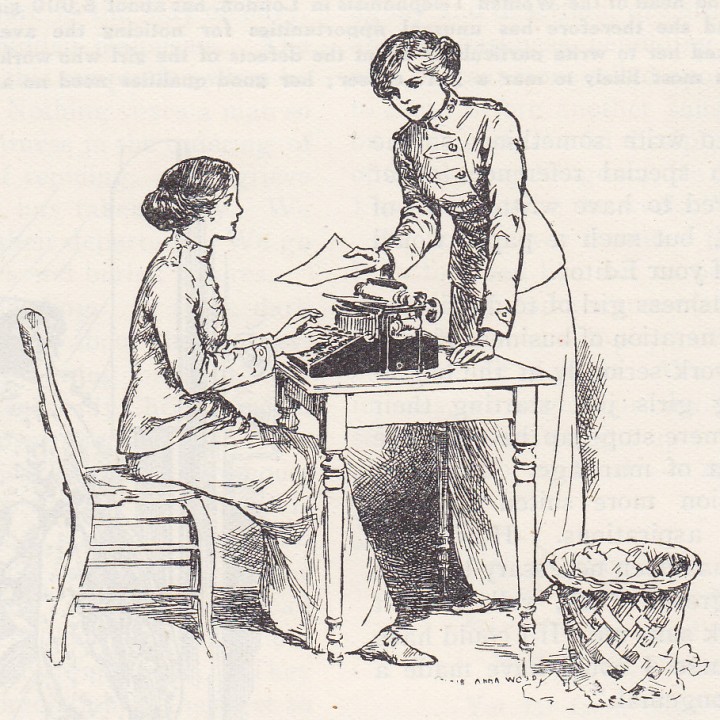Looking to the past to share a future

“I should like to try…”
These were the words of young Agatha Miller when she was told detective stories were too difficult to write. We know her now as Agatha Christie, Queen of Crime and creator of detectives Hercule Poirot and Miss Marple.
I should like to try. I love these five words. They summed up my transition from buried-under-books student to owner/manager of a historical theatre company, and my eventual specialisation as a costume historian. I now run the History Wardrobe series of costume-in-context presentations, with a packed diary of events across the UK. I’ve just had my first costume history book published – Great War Fashion, Tales from the History Wardrobe, and my next book Fashion: Women in World War One will be out in April.
I never quite intended any of this. I read English at Cambridge University and loved the immersion in literature. An MA in Medieval Studies gave me a huge appreciation for cross-curricular studies and an introduction to a great group of friends. An ‘I should like to try’ attitude took me out of academia and into the world of self-employment.
It wasn’t easy. My mother wanted me to be a Professor at Cambridge. (Or marry Prince William, whichever would give her greater status.) Even in the 1990s there was still an ethos of, ‘Oh, if you’ve done English you’ll be a teacher/librarian/actor.” I love teaching. I love books. I love performing BUT I didn’t want to follow the route laid out for me by other well-meaning people, who wanted me to be ‘safe’ in a sphere of employment they could understand. Setting up my own company meant I could combine all my interests, plus I have a delightful collection of historical garments to delight the senses when too much research gets my brain tied up in knots.
I seemed to live off nothing but toast for a long time. I was determined never to rely on the whim of funding bodies and so took courses on marketing, business planning and financial planning etc, and followed the sterling advice of Keep Your Overheads Low. After performances I was often asked ‘Do you do this for a living?’ How thrilling it was to answer emphatically: Yes.
‘Don’t you want a Real Job?’ I was also asked.
What’s not ‘real’ about combining talent, skill and hard work?
Now I’ve been in business for 15 years, with a great team of freelance staff, a well-nurtured client base and many, many creative ideas to explore in the future. There are, of course, the expected insecurities: Can I maintain the success? Can I keep well enough to work? Can I resist workaholism? I know I need to keep researching, promoting and learning. Some people regard self-employment as a fragile world, and there are elements of risk. Is the ‘real’ world of work so very free from fear? (Fear of redundancy; relocation; pay cuts; discrimination…) As for the problems of trying to thrive in a niche market, I wouldn’t – no, couldn’t – change my livelihood.
While researching World War One I came across many articles written for businesswomen at the start of the new century. Here are some gleanings regarding starting up businesses from Woman’s Life in 1919. They still resonate with me nearly 100 years later, and they are still valid for anyone – male or female – thinking of developing their own creative enterprise:
1) Start small. Clients do not grow, like mushrooms in the night.
2) A woman who starts on her own must have a thorough grasp of her business. She must work under others – start from the commencement, and learn all the time as she slowly obtains promotion.
3) Keep a good banking account, or your business is doomed.
4) Work that is a burden can never be successful. But the work which holds out enchanting possibilities, which quickens the brain, suggests improvements all the time, is bound to succeed, for it is at once an absorbing interest and pleasure.
5) To believe that you are bound to be successful is half the battle. Often it is a long uphill climb before it is possible to create profits. The most that can be expected is to pay one’s way, until chance clients become regular ones, and the business is firmly established.
Whatever your talents or background it is worth daring to wonder whether there are roads less travelled to explore, rather than using ‘safe’ as the only criterium for your work.
The Girl’s Own Paper of 1915 published a warning about seeking employment during times of economic hardship: “Life is not going to be very easy for the wage-earner during the next few years – though this fact will probably develop girl’s character and make her of far more use to the world than if she led a life of ease.”
The paper’s advice on how to cope is as valuable today as it was then – Work long hours, study your subject, think out problems and solve difficulties, and to refuse to accept failure as final at any point.
To this advice I will only add – Think like Agatha Christie. Think – I should like to try.
www.historywardrobe.com
www.greatwarfashion.com
www.ljadlington.com
facebook page historywardrobe
twitter @historywardrobe
This post has been written by Lucy Adlington in order to help history startups!

